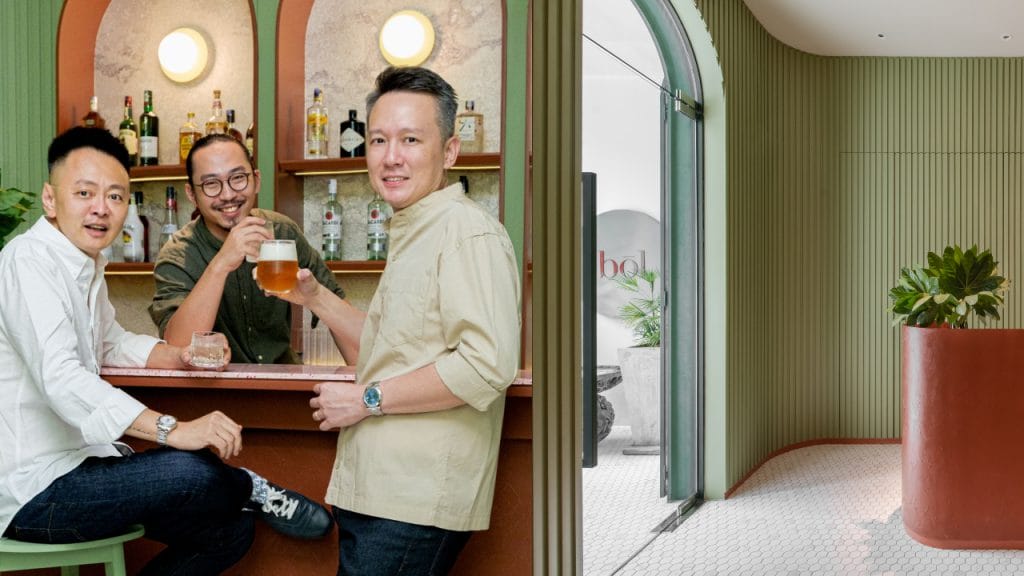Culinary Hotspot Bol Is A Tribute To Friendship, Dreams, Memories And Heritage

The trio behind one of the latest hotspots to hit the burgeoning Kula Lumpur F&B scene first conceived of the food before the restaurant. It all began five years ago when Kian Liew, the artistic component of the trio, found himself in Paris and involved in a pop-up concept at a friend’s Asian bistro called Bol. The effort was a success, and it fanned his aspirations to start a place of his own. Earlier this year, that dream was realised within a beautifully restored and entirely refurbished pre-war house in the lively neighbourhood of Jalan Sin Chew Kee, steps from a bustling weekend brunch and hopping bar scene. The name Bol is a tribute to the origin of inspiration.

Liew, who heads global interior design for an international hospitality group, says his fascination for Peranakan architecture, heritage and the cuisine is something the team worked to represent through Bol. The entire restaurant, which seats 82 pax at a time, entailed a tour de force in its creation due to the frequent lockdowns and restrictions with project management done remotely. The result, however, has already proven incredibly popular with the city’s happening set and for good reason.


Bol’s sensory extravaganza begins the moment you arrive, with a charming bar leading into the first of several dining rooms – with dreamy powder rooms on each floor – while soft jazz plays in the back. “What we wanted was for the design, and the food, to mirror each other,” Liew says. “It’s unassuming at first, and as you approach, there is an explosion of colour and senses through the heavy flora and fauna prints. It then goes to something more flamboyant until you arrive at the glasshouse on the top floor where it becomes lighter once again, with the use of coloured paper leaving you with an imprint and memory of the place.”
View this post on Instagram
What is novel about this restaurant is that it’s one of the few Peranakan-inflected restaurants that offers a pork-free menu, and just as surprisingly doing away with service charge. “You’re here for the service – that’s part of the dining experience,” Liew explains. While co-partner Patrick Hong manages the books given his background in corporate advisory, the third part of the triumvirate, Joel Kirk, leads the kitchen team. Here, Kirk utilises his Noma training to produce a condensed line-up of pleasing starters, mains and desserts. The focused menu leads to some fairly sensational results as the kitchen team adeptly prepares for each course with trained precision.

Crab cakes are made in house with fresh panko, and the citrus green chilli dressing and coconut tartare are just as fresh, as the chef eschews pre-mixes which lean too heavily in the manufactured umami. Scallops are cooked in a broth of fresh crabs and coconut, sweetened with kaffir lime oil and then pan-seared. A squid-ink assam octopus works on maximising the flavours of the Spanish octopus via torching with gooseberries to extract its latent flavours, finished with a coriander pesto. Perhaps the dish that most represents the modernism embedded in Bol’s cooking techniques is the Rojak Tart, where the homemade shell containing jelly fish, jicama and kyuri bursts with the flavours of kalamansi, tamarind and pineapple in surprising way, each new sensation revealing itself through every bite.


While it may be difficult to try everything at one go – much as one might like to – the idea at Bol is family style plates in the convivial setting so that all may sample the ingredients, textures and flavours created from the long hours of experimentation. Case in point: the Buah Keluak Lamb Shank, a clear winner in the flavour stakes – redolent with complexity and depth of the enigmatic keluak which forms the base flavour, sweetened with sautéed daikon and Brussel sprouts, with an accompanying coconut mash. Likewise the Sea Bass ‘Kapitan’ where shallots are freshly peeled in the kitchen, and the Rendang Wagyu, fried with spices minus onions and garlic so it doesn’t become too cloying. To pair with the food, diners may opt for house cocktail made with pandan, Malibu and coconut cream, and the Chi-Serai cocktail composed of Bacardi dark rum, lemongrass, lychee and lemon juice. And, of course, given the exceptional ambience and celebratory air, there are champagnes as well as wines – both Old and New Worlds.


A duo of desserts – Hawthorn Melaka and Guava Sop – provide a formidable end to the meal, one which hits the many high points modern Asian cuisine, with what Liew calls “heavy influence of Nyonya flavours.” He is careful not to brand Bol as a Peranakan restaurant and notes that he has not made it easy on himself, starting a restaurant serving quintessentially Malaysian flavours to Malaysians. The fact remains that much of the recipes were the result of his love for cooking, and seeing how the food brought people together. “That’s what really motivated me – the idea of being part of a kitchen, not just a physical restaurant – to bring people together.”
For reservations, contact Bol on Whatsapp.
Photos: David Yeow












